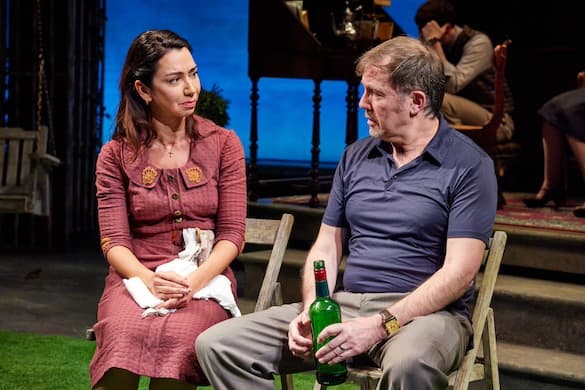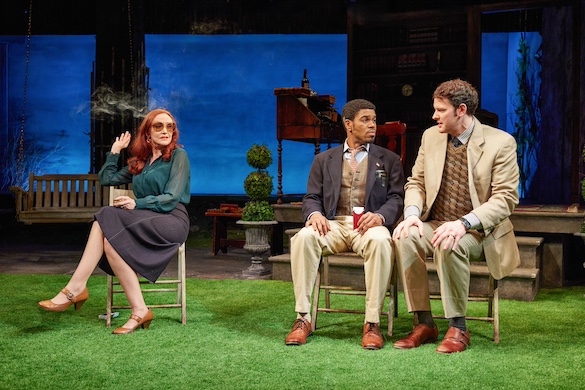Irish Repertory Theater Offers a Potent, Poignant Revival of Brian Friel’s ‘Aristocrats’
Set in the mid-’70s, this play from Ireland’s answer to Chekhov is a study in the decline not just of a family but of a class and culture.

The gathering in focus in Brian Friel’s “Aristocrats” might have, under different circumstances, been a joyful reunion. The youngest of five siblings in an established Irish Catholic family, Claire O’Donnell, is about to be married, and a brother and sister have returned to the sprawling home at Ballybeg — the fictional town in which Friel set a number of his works — that Claire shares with another sister and their elderly father.
Of course, it’s not for nothing that Friel was considered Ireland’s answer to Chekhov, and what unfolds in this play — first produced in 1979 at Dublin’s Abbey Theatre, now being robustly revived by Irish Repertory Theatre — could hardly be described as a celebration. Claire, it turns out, has struggled with manic depression and isn’t in love with her much older fiancé. The brother, Casimir, is a high-strung fabulist, and the visiting sister, Alice, is an embittered alcoholic; both are grappling with their own psychological trauma.
Also present is Alice’s brutish husband, Eamon, who carries a torch for Judith, the self-sacrificing sibling who has devoted herself to caring for Claire and their father. The latter only appears briefly — the recorded voice of his absent daughter lures him out in one particularly harrowing moment — but he can be heard sporadically bellowing over a baby alarm, managing to tyrannize his children even in his feeble condition.
There is another guest, one Tom Hoffnung, a professor from Chicago who has arrived at Judith’s invitation. Tom is doing research on, as he describes it, “recurring cultural, political, and social modes in the upper strata of Roman Catholic society in rural Ireland since the act of Catholic Emancipation.” The O’Donnells will provide plenty of fodder, little of it encouraging.

Tom’s presence and his project are key, as “Aristocrats,” set in the mid-’70s, is a study in the decline not just of a family but of a class and culture. In this potent, poignant revival — part of Irish Rep’s “The Friel Project,” which kicked off last fall with a luminous staging of “Translations” and will continue in the spring with “Philadelphia, Here I Come!” — the intersection of and synergy between those trajectories are made hauntingly plain.
Director Charlotte Moore has recruited first-rate actors to capture the fraught camaraderie between Friel’s characters. Danielle Ryan and Sarah Street respectively evoke Judith’s resigned stoicism and Alice’s alternately frigid and boozy wit, while Meg Hennessy relays Claire’s repressed restlessness — the product, at least in part, of her father’s stifling authoritarianism — with great sensitivity.
Tim Ruddy ensures that Eamon’s bluster never quite tips over into menace, even as his character bullies the others — including the relatively imperturbable Tom, played here with grace and wit by Roger Dominic Casey — and reveals unsettling details about his in-laws. We learn of a disgraced matriarch, and how the O’Donnell men have slipped steadily in standing through generations.
Eamon also abuses his wife, though he is perhaps most unkind to Casimir, who emerges as the play’s most patently pitiable figure. Tom Holcomb is heartbreaking in this role, punctuating his lines with a nervous laughter that betrays the young man’s crippling anxiety. Casimir recalls discovering, early on, that he was “different from other boys,” and remembers his father’s cruel response. At points he cowers, or curls up next to Claire, as if trying to shield himself from the crumbling within and around him.
Charlie Corcoran’s scenic design, with its touches of faded grandeur, reinforces the sense of personal and social deterioration at the play’s core. “There are certain things … certain truths,” as Eamon tells Casimir in one of his gentler moments, “that are beyond Tom’s kind of scrutiny.” Friel, for his part, managed to make those truths painfully palpable, even to outsiders like us.

